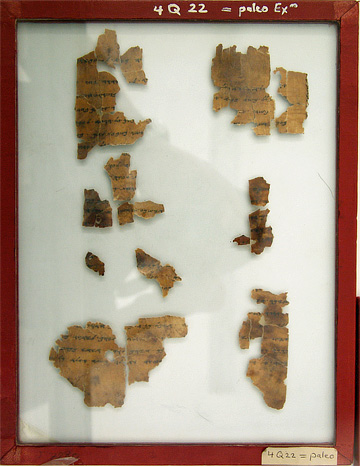Thirty years ago, when I was studying New Testament in graduate school, it was widely assumed that Jesus spoke Aramaic as his first language and taught in Aramaic. I can’t remember a conversation in which the possibility that Jesus spoke or taught in Hebrew was seriously considered.
Since my days in grad school, however, some credible scholars have begun to argue that Jesus either spoke Hebrew as his first language, or used Hebrew when he taught, or both. (By “credible scholars,” I mean people who have mastered the relevant languages and historical/cultural data, whose arguments are taken seriously by others with similar credentials, and who don’t seem to have an agenda that forces the evidence in a predetermined direction.) I am thinking, for example, of members of the Jerusalem School of Synoptic Research. Unfortunately, many of those who make the case for a Hebrew-speaking Jesus seem to be motivated by something other than a desire to know which language(s) he actually spoke.)
So what evidence do we have that Jesus spoke Hebrew?
We do not have in the New Testament Gospels a quotation of Jesus in Hebrew such as we have in Aramaic (Talitha koum). We do have his use of words, such as abba, that are Aramaic but are also found in some Hebrew dialects. More importantly, we do have a few instances in which a Hebrew word is preserved in the Gospels as having been spoken by Jesus. Perhaps the most well-known example is his frequent use of amen, which is a Hebrew word (for example: Matt 5:18, John 3:11, and many others). (I think amen was absorbed into Aramaic at some point in its history, but I can’t remember the details.)
There is one story in the Gospels that strongly suggests Jesus knew and spoke Hebrew. In Luke 4, Jesus went to his hometown synagogue in Nazareth. In the midst of the gathering, he read from the scroll of the prophet Isaiah. This reading was most certainly in Hebrew. Even though he spoke Aramaic as his first language, Jesus had learned Hebrew, like almost all Jewish men in his day. But we don’t know whether Jesus, upon finishing his biblical reading, continued to speak in Hebrew, or rather transitioned into Aramaic.
Many stories in the Gospel also support the theory that Jesus could use Hebrew when it suited his purposes. Jesus frequently found himself in conversations and debates with Jewish religious leaders. These dialogues usually happened in Hebrew, even among those for who Aramaic was a first language. For Jesus to be credible as a debate partner, and for him to impress his audience as a learned teacher, in all likelihood he would have used Hebrew when engaging in theological discourse with the Pharisees, the Scribes, and other Jewish leaders.
Many of those who believe that Jesus spoke Hebrew primarily and taught in Hebrew primarily (or exclusively), point to the evidence from the Dead Sea Scrolls. The scrolls demonstrate that Hebrew was being used in the time of Jesus, and had not been completely eclipsed by Aramaic. (Photo: One of the Dead Sea Scrolls, 4Q22, a portion of Exodus in Hebrew)
 Yet this evidence of the scrolls is not nearly as strong as some believe, in my opinion, for three reasons. First, the community that wrote the Dead Sea Scrolls was a highly nationalistic and separatistic community. Of all Jews, the folks at Qumran were perhaps the most likely to reject foreign languages and to use Hebrew as a political and religious statement. Assuming that the Dead Sea Scrolls tell us something about the average Jew in the time of Jesus would be a little like arguing that since Amish people speak Pennsylvania Dutch (German) that language is used throughout the United States. Second, we have evidence that Hebrew was used among some Jews in Judea, where the scrolls were found. But we have virtually no evidence for the conversational or official use of Hebrew in Galilee in the time of Jesus. It’s a mistake to assume that what was done in Judea would also have been done in Galilee. Third, even among the Dead Sea Scrolls we find documents in Aramaic. This is surprising, given the Qumran community’s apparent and understandable preference for Hebrew. This suggests that Aramaic was commonly used by Jews who were not part of Qumran, and was even known and used by members of the Qumran community.
Yet this evidence of the scrolls is not nearly as strong as some believe, in my opinion, for three reasons. First, the community that wrote the Dead Sea Scrolls was a highly nationalistic and separatistic community. Of all Jews, the folks at Qumran were perhaps the most likely to reject foreign languages and to use Hebrew as a political and religious statement. Assuming that the Dead Sea Scrolls tell us something about the average Jew in the time of Jesus would be a little like arguing that since Amish people speak Pennsylvania Dutch (German) that language is used throughout the United States. Second, we have evidence that Hebrew was used among some Jews in Judea, where the scrolls were found. But we have virtually no evidence for the conversational or official use of Hebrew in Galilee in the time of Jesus. It’s a mistake to assume that what was done in Judea would also have been done in Galilee. Third, even among the Dead Sea Scrolls we find documents in Aramaic. This is surprising, given the Qumran community’s apparent and understandable preference for Hebrew. This suggests that Aramaic was commonly used by Jews who were not part of Qumran, and was even known and used by members of the Qumran community.
Given Jesus’ roots in Nazareth, and given his early ministry among common folk in Galilee, it seems most likely that he usually employed Aramaic in his teaching, and this is confirmed by the data of the Gospels. But, given the likelihood that Jesus knew Hebrew as a second language, and given his frequent debates with Jewish religious teachers, and given the movement of his ministry to Judea, where Hebrew was more common, I am convinced that Jesus did teach in Hebrew at times.
For some, this conclusion is not acceptable. They argue that Jesus spoke and taught exclusively in Hebrew. In my next post in this series, I’ll examine the arguments for this position.

